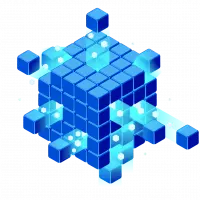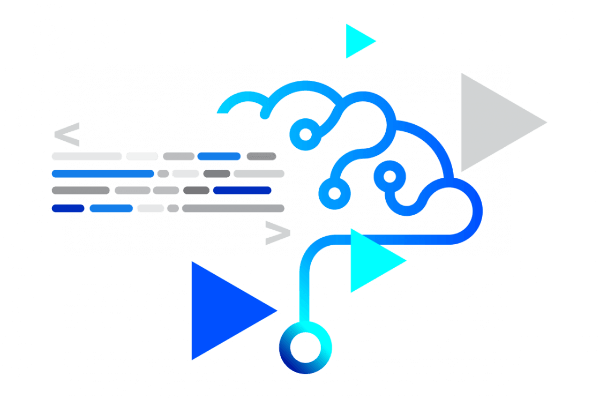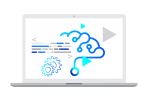What is quantum machine learning?
Quantum machine learning uses quantum computing to accelerate and enhance the machine learning that is carried out on the computers we use every day. But quantum computers still have a long way to go before they are at their best. In this article, you’ll learn more about quantum machine learning, quantum computers and their future potential.

How does quantum machine learning work?
Quantum machine learning takes advantage of the information processing capabilities of quantum technologies to improve and accelerate the work done by a machine learning model. Quantum machine learning uses algorithms that run on quantum devices, such as quantum computers.
Quantum computers have much greaterstorage and processing capabilities than classic computers. This ability to store and process huge amounts of data, especially through the use of quantum notebooks, means that quantum computers can analyse vast data sets that would take longer with conventional methods.
How a quantum computer works
Quantum computers use quantum mechanics to produce a data-processing capacity that is vastly superior to even today’s most advanced supercomputers. While classic computers store information using binary bits (1 or 0), quantum computers exploit the sometimes confusing laws of quantum physics to store information on subatomic particles called quantum bits, or qubits. These can contain more data than their traditional counterparts and can be used for more complex calculations.
This doesn’t mean that quantum computers will replace your laptop or tablet any time soon. In the future, quantum computing solutions will likely involve the parallel use of classic and quantum computers, each of which are suitable for specific tasks.
Quantum computers are also expensive and sensitive to decoherence, which involves the degradation of a qubit's quantum state due to common environmental factors such as temperature fluctuations and physical vibrations.
The advantages of quantum machine learning
The term “quantum advantage” generally refers to speed, but is not strictly defined. When someone claims to be able to perform a computation in 200 seconds when it would take a supercomputer thousands of years, this is a quantum advantage. But speed is far from the only advantage of quantum machine learning:
Speed
The Holy Grail of quantum computing is solving problems that take considerable time and classic resources.
Size
As with data compression, quantum computers are well-suited to searching for patterns and relationships in high-dimensional data.
Complexity
Quantum algorithms can solve problems in fewer time steps than classic algorithms, indicating greater efficiency.
Sampling
Quantum computers can naturally sample probability distributions for a wide range of applications, including generative algorithms.
Compression
Large data sets requiring prohibitive amounts of conventional memory can be mapped to a relatively small number of qubits.
Interferences
Constructive and destructive interference can be exploited to increase the likelihood of finding correct solutions and decrease the likelihood of finding incorrect solutions.
Types of applications for quantum machine learning
The integration of quantum computing within machine learning, known as Quantum Machine Learning (QML), promises to radically transform our approach to analysing data and solving complex problems. This groundbreaking fusion opens up new possibilities. Here are a few examples:
Faster algorithm calculations
Using quantum computing and cloud solutions, we can make learning algorithms on huge data sets faster and more efficient. Quantum machine learning (QML) algorithms can be ultra-fast compared to classic machine learning.
Resolving complex data models
Quantum computing can help you solve complicated data patterns that cannot be solved by conventional machine learning and deep learning algorithms. If you have very complicated data sets where correlations and data models are not recognisable and solvable, quantum computing can allow you to work with them.


Developing advanced algorithms
Quantum computing, along with the integration of machine learning, can help you develop more advanced machine learning algorithms. Advanced algorithms integrated within quantum computing can solve more problems in less time and with greater accuracy.
Progress in reinforcement learning
Integrating quantum computing into reinforcement learning offers promising opportunities to significantly enhance the capabilities of processing and decision optimisation. With the power of quantum computing, complex solutions can be explored more efficiently and multivariate environments can be managed, thus speeding up the learning process. These advances have potential applications in many fields, such as finance and personalised medicine.
Advanced computer vision
Quantum machine learning can also help you advance the application of computer vision and make existing deep learning algorithms faster and more efficient. With the help of quantum machine learning, you can develop more advanced and accurate image processing and segmentation applications.
How do I use quantum machine learning?
The use of quantum machine learning involves several steps and considerations, especially as it is a field that intersects quantum computing and machine learning. Here's a comprehensive approach to help you get started in quantum machine learning:
Understanding the basics
Combining an in-depth understanding of quantum computing with machine learning is key to getting started in quantum machine learning. This includes learning about fundamental concepts in quantum computing, such as qubits, superposition, entanglement, and quantum gates.
At the same time, a solid understanding of the principles of machine learning, including expert knowledge in different algorithms and data processing techniques, is crucial. This dual expertise is the key to unlocking the full potential of quantum machine learning.
Learning specific quantum algorithms
To deepen your quantum machine learning skills, it’s important to study the specific quantum algorithms that play a central role in this field. This includes being familiar with advanced techniques such as the quantum Fourier transform, Grover's algorithm, and quantum phase estimation.
You will also need to explore how classic machine learning algorithms can be adapted in a quantum context, such as in the case of quantum support vector machines or quantum neural networks.
Perform simulations
To get started, begin by simulating quantum algorithms on a classic computer – this is a critical step in understanding how they work without the need for immediate access to a real quantum computer. Then, use quantum computing executives to develop and test these algorithms on a small scale.
This step-by-step approach makes it possible to get to grips with quantum computing principles and techniques in practical terms, while laying the foundation for more advanced applications and experiments on real quantum systems.
Find and build practical applications
Revolutionising industries like pharmaceuticals and finance often requires engaging in cutting-edge research and development. It is worth bearing in mind, however, that quantum machine learning is a growing field with practical applications still in the exploration phase, promising significant advances but requiring a cautious and innovative approach.
FAQ
What is the principle of quantum computing?
Quantum computers use qubits that, through quantum superposition and entanglement, enable much more powerful data processing than the classic bits of traditional computers.
💡 Quantum entanglement is a strange yet fascinating phenomenon. According to this theory, two or more particles are interconnected in such a way that their properties are linked, regardless of how far apart they are. It's as if you have two magic coins: when you flip one and it comes up heads, the other instantly comes up tails, even though they're in different cities. This link is so mysterious that it looks like they're exchanging secret information. In fact, it's just the strange way quantum particles work.
What is the major advantage of quantum computing?
Quantum computing offers a superior computing capacity, allowing vast volumes of data to be processed simultaneously and opening up revolutionary prospects in cryptography, pharmaceutical research and artificial intelligence.
Who uses quantum computing?
Quantum computers are used by cutting-edge researchers and industries, with increasing access for businesses and developers via innovative cloud computing solutions. The technology is used in fields such as materials science, pharmaceuticals, cryptography and artificial intelligence, where complex problems require massive computing power.
Quantum computers can solve problems that classic computers could take years, if not centuries, to solve. In recent years, the trend has been to make quantum computing accessible to a wider audience through cloud-based solutions.
This allows innovative companies and developers to harness the power of quantum computing without having to build and maintain their own quantum machines. This is a promising and fast-growing area, with the potential to revolutionise a number of sectors in the future.
OVHcloud and quantum machine learning

Get your projects and models off to a flying start with notebooks.
Are you a data scientist or developer looking to launch a notebook in less than 15 minutes? Use our AI Notebooks solution to quickly access Jupyter or VS Code, and launch your notebooks right away with the resources you need.

The power of artificial intelligence to empower everyone
Artificial intelligence (AI) is often seen as an aspect of data science reserved only for those who are experienced in the field. At OVHcloud, we believe in the outstanding potential of this practice in all business sectors. And we believe that its complexity should not stand in the way of the use of big data and machine learning.